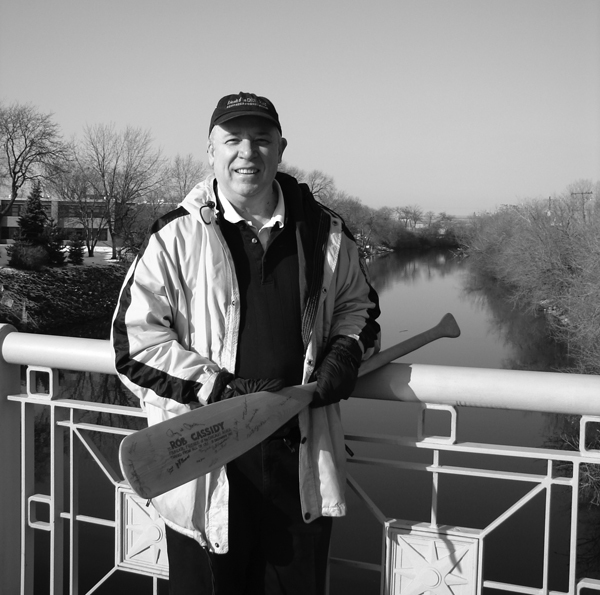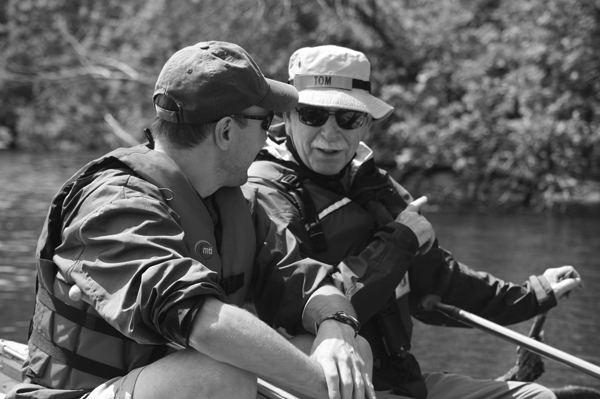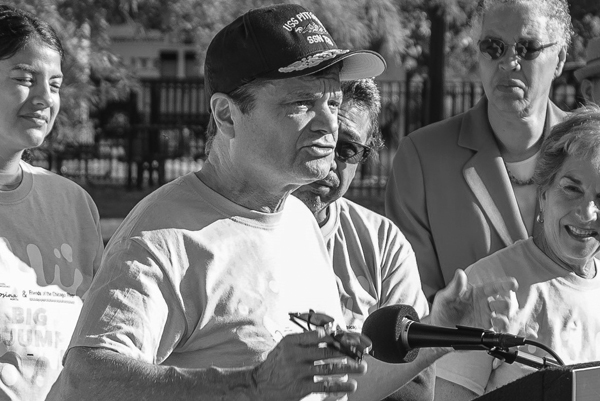Friends at 40: Forty People Who Made a Difference

It would be impossible to include all of the extraordinary individuals who have played a role in the extraordinary recovery of the Chicago River system and Friends’ growth since our founding in 1979. Volunteers, staff, board members, community members, business leaders, mayors, congressmen, senators and even presidents have contributed their passion, talent, resources, and expertise. These 40 are among those multitudes which also very likely includes you!

1. Joanne Alter: The first woman to win a county-wide seat when she was elected to serve as an MWRD commissioner in 1972. Alter brought that same passion and leadership to Friends as one of our founding members on Friends’ inaugural steering committee. Alter was committed to ridding the river of sewage.

2. Fred Axley: Axley was a member of Friends’ board of directors from 1998 until he passed away in 2013 and provided invaluable non-proft experience and enormous knowledge of how organizations succeed and fail. He was a member, volunteer, board president, and served on the fnance, board governance, planning, and bridgehouse development committees and as a water quality advocate representing Friends with Illinois EPA and local elected officials.

3. Geoffrey Baer: In addition to bringing the Chicago River into everybody’s living room in 1995 with his WTTW series “Chicago by Boat,” Baer has served as a Chicago River Summit speaker and moderator, and a member of Friends’ Halloween Boat Float committee. A regular volunteer for Chicago River Day, he brought his children in 2017 when Friends’ efforts became a highlight of his updated The Chicago River Tour.
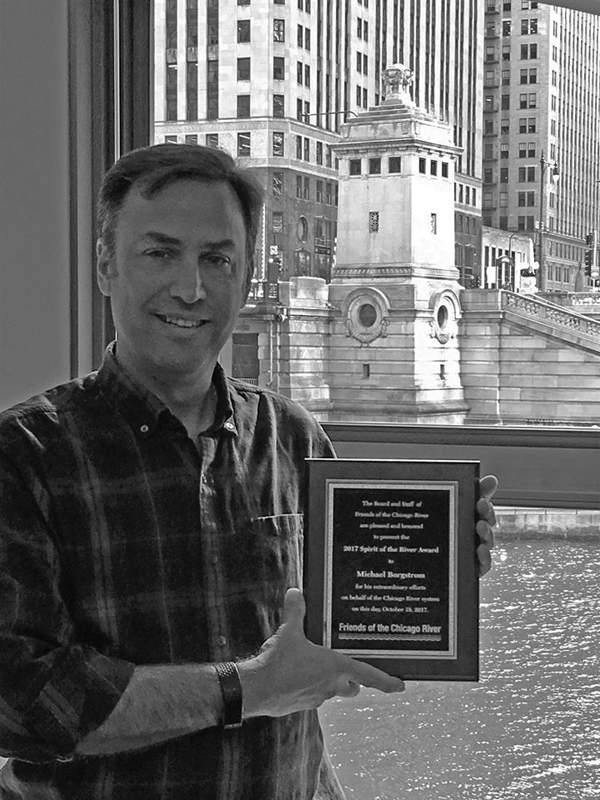
4. Mike Borgstrom: The president of Wendella Sightseeing Company, Borgstrom has been working with Friends since 1991. Active in reducing the risk from aquatic invasive species and a founding member of the Harbor Safety Committee, he is a member of Friends’ Bridgehouse Committee and has provided Friends ongoing access to his fleet enabling us to entertain members, stakeholders, and elected offcials, and raise operating support.

5. Cathy Breitenbach: A member of Friends’ Planning Committee, Breitenbach joined Friends in 1997, managing several initiatives including Friends’ burgeoning Urban Canoe Adventures program until 2001. Since then she has continued to have a profound effect on improving the health of the river and access to it as river liaison in Mayor Richard M. Daley’s office and in her present position as director of natural and cultural resources for the Chicago Park District.

6. Marjorie Brownstein: A part of the planning team that explored the use and potential for Friends’ McCormick Bridgehouse & Chicago River Museum, Brownstein is a founding member of Friends’ Bridgehouse Committee and co-chair of the Bridgehouse Summer Cruise. Brownstein has used her professional talents and creative energy to establish the Bridgehouse as one of Friends’ broadestreaching programs.

7. Jane Byrne: The first Chicago mayor to take consequential action to protect the Chicago River, Byrne appeared at Friends’ first conference in 1980 and endorsed our plan to ”restore and rejuvenate” the lands that border the river. With her support, Friends and the Chicago Department of Planning and Development created the first protective river ordinance, approved in 1983.
8. Robert Cassidy: In August 1979, urban planner Cassidy triggered Friends’ creation with his Chicago magazine cover story, “Our Friendless River,” which decried the state of the Chicago River and laid out an action plan to address it. His appeal and actionable agenda attracted attention from civic leaders and community members. Cassisfy was Friends’ first chair.

9. Grant Crowley: A constant source of information and expertise, Crowley has been helping Friends succeed since before he joined the board of directors in 1992. The president of Crowley’s Yacht Yard, he is active in ensuring people of all ages are on the water through a multitude of community outreach programs.

10. Richard M. Daley: Under Daley’s administration as mayor, the City updated the Chicago River Corridor Design Guidelines, added a requirement for a 30-foot setback for public access, published the Chicago River Agenda that set lofty benchmarks for water quality, and secured an Act of Congress to create the Chicago Riverwalk, building the first plazas and underbridge connections.

11. Dick Durbin: As a U.S. senator, Durbin has been a terrifc advocate for clean water and green infrastructure assuring the river’s improvement. In addition to attaining funds to complete the Tunnel and Reservoir Plan, Durbin was a vocal advocate who in 2011 hosted a summit and river tour to advance protections of the river as a recreational resource and sewage effluent disinfection.
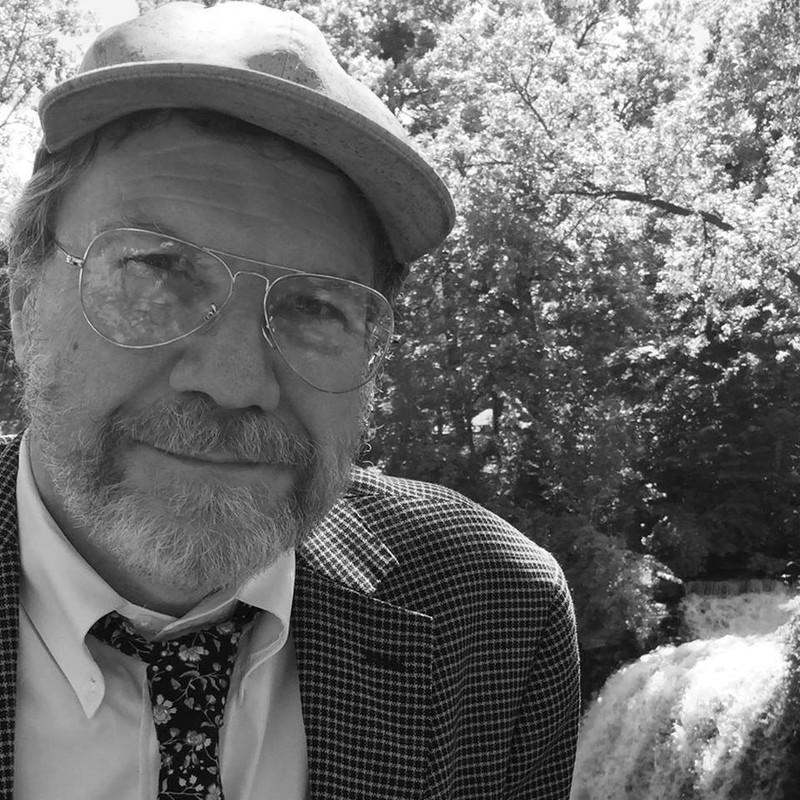
12. Albert Ettinger: With decades of experience enforcing and defending the Clean Water Act, environmental attorney Albert Ettinger has played a critical role in improving the health of the Chicago River system. His knowledge and expertise have resulted in increased water quality standards to protect people and aquatic life, more stringent phosphorus limits, and a sunset for the construction of the Tunnel and Reservoir Plan.

13. Rahm Emanuel: As a mayoral candidate, Emanuel embraced sewage effluent disinfection. Under his direction as mayor, the City completed the Chicago Riverwalk exposing millions of more people to the water and built new boat houses, trails, and underbridge and over river connections not only downtown. He established the Chicago River Ecology and Governance Group to institutionalize ecologically sensitive riverbank improvement and protection.
14. Jim Filippini: Decades of experience in the water division at USEPA made Filippini a knowledgeable water resource expert for Friends and expanded Friends’ technical understanding and advancement of water quality issues. Filippini served on Friends’ technical advisory committee, Action Plan for the Chicago River charrette team, and worked to reduce combines sewer overflows.
15. Gene Fleming: The chief of the environmental formulation and analysis section of the U.S. Army Corps of Engineers, Fleming ensures ecosystem restoration projects happen along the Chicago River. Under his guidance, over 114 acres of riverbank and adjacent lands at Horner, Legion, River, and Ronan parks have been restored; the North Branch Dam was removed at River Park; and a 40-acre instream and riverbank restoration is planned for Bubbly Creek.

16. Bill Frederickson: The founder of the North River Commission in 1962, Frederickson was an influential community voice who served as a member of Friends’ original steering committee and was at the first meeting that launched Friends. Frederickson, a North Park College professor, was instrumental in institutionalizing river improvements into development along the North Branch. Photo courtesy of North Park College.
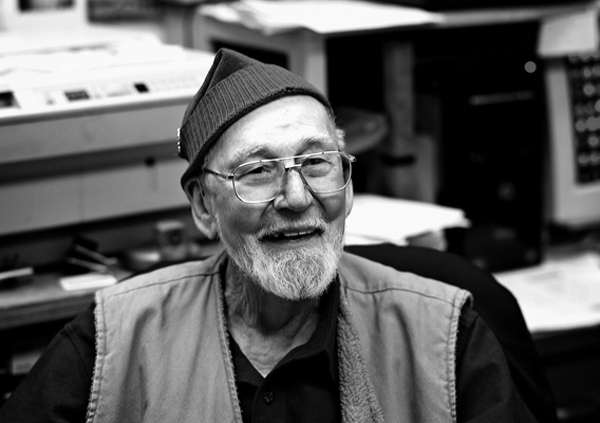
17. Ralph Frese: Blacksmith, canoe maker, conservationist and proprietor of the Chicagoland Canoe Base, Frese, is directly responsible for ensuring that tens of thousands of people paddled Chicago-area rivers, including Robert Cassidy who was with Frese on the journey that resulted in “Our Friendless River” and the creation of Friends in 1979. Frese rented canoes to Friends enabling our early paddling endeavors. Photo courtesy of .

18. Wink Hastings: In 1992 Hastings began as the National Park Service project coordinator for the Chicago Rivers Demonstration Project working closely with Friends, and regional and federal agencies to assess the condition of the Chicago River system and involve citizens and communities in developing and implementing restoration projects. His efforts resulted in the restoration of Gompers Park in Chicago and the Prairie Wolf Slough Wetlands Demonstration project in Deerfeld.
19. David Jones: The heart and soul of Friends for many years, Jones was an urban planner; Friends’ volunteer, board, and staff member; and faculty at Northeastern Illinois University. Jones was one of the first people to call Robert Cassidy; was Friends’ second chair; and used his planning knowledge, artistic ability, community organizing, warm nature and genuine passion to advance Friends’ goals from 1979 until he passed away in 2015.
20. Tom Judge: Judge was a one of the more than 100 people who in 1979 attended the first offcial meeting of what became Friends. Active ever since, he has been a volunteer canoe guide for over 20 years and volunteered at almost every Friends’ event. Judge is a master at putting new paddlers at ease and bringing the river to life through history and humor.
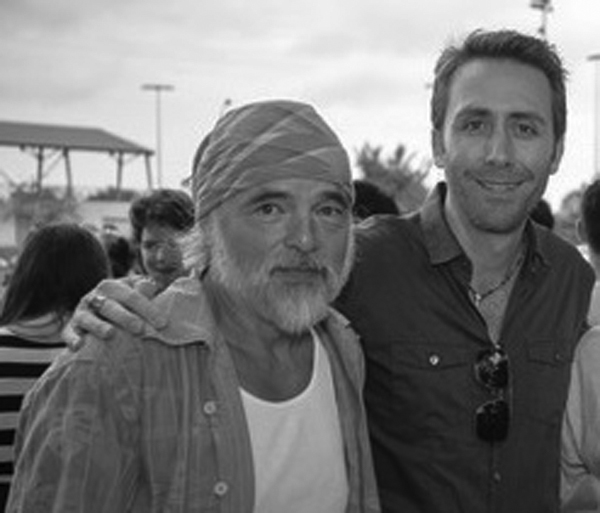
21. Pete Leki: A river advocate since 1994, Leki, left in photo, is a founding member of the Riverbank Neighbors community centered around riverbank restoration in the North Center neighborhood. Leki has been a Friends’ member for over 25 years and has led thousands of students on Chicago River School Network feld trips, is a site steward for LaBagh Woods Sauganash Prairie, and leads the Waters School Garden project.

22. Josina Morita: An urban planner and MWRD commissioner, Morita’s energy and enthusiasm made it possible for us to jointly launch the Big Jump, an in-the-water demonstration event that showcases water quality improvements and a future of swimming in the river. Morita convinced a host of elected offcials from all levels of government to swim in the river for the Big Jump as well.
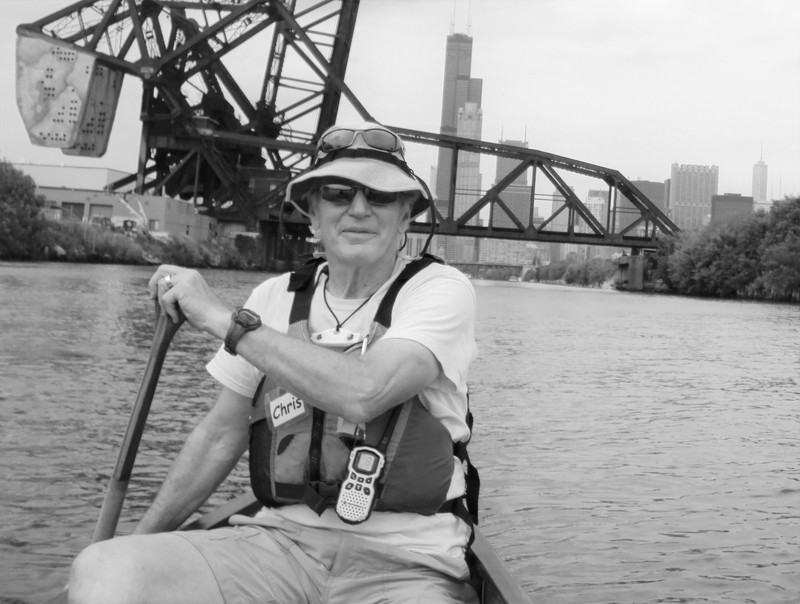
23. Chris Parson: Parson was hired as Friends’ education manager in 1997 to design an education program to teach students about the value and health of the Chicago River system. After a national survey, he developed the Chicago River Schools Network which has impacted 400,000 students since. Upon retirement in 2003, Parson continued to volunteer on feld trips, joined Friends’ volunteer-driven canoe program, and participates in many Friends’ events.
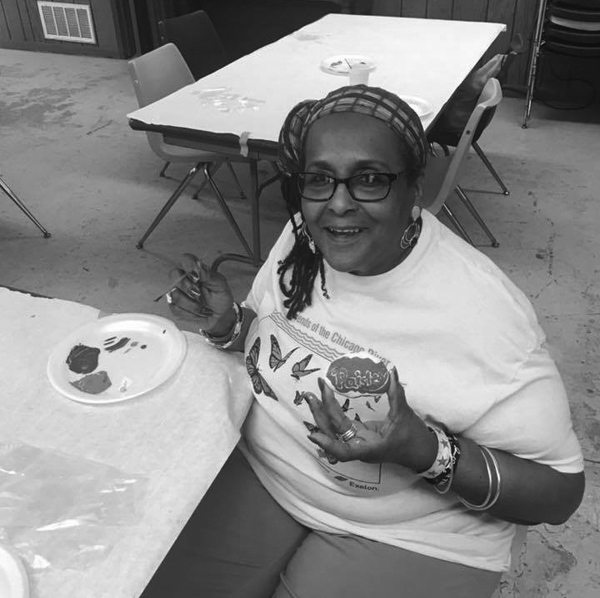
24. Pat Parsons: A retired Chicago Public School teacher, Parsons was responsible for thousands of students learning about science, nature, and the river through Friends’ Chicago River Schools Network. Friends’ 2003 Educator of the Year, Parsons’ enabled her Gage Park High School students to go on river feld trips to research water quality, assist in river-bank restoration, lecture at the Chicago River Student Congress, volunteer on Chicago River Day, and tutor middle school children.
25. Janet Pellegrini: An environmental scientist for USEPA Region 5, Pellegrini impacted aquatic life standards for the Chicago River system by urging a government alliance to catalog dead fsh collected as part of a maintenance operation at the O’Brien Lock on the Calumet River. The data revealed that native fsh reproduction was occurring and there was a greater abundancy of fsh species and fsh.
26. Steve Pescitelli: Dating back to at least 1998, Pescitelli, an Illinois Department of Natural Resources aquatic biologist, has been helping Friends make the river a better place for fsh. Pescitelli has worked with us to identify dams that needed to be removed, design and install channel catfsh nesting cavities, implement a plan to remove the barriers to fsh in Mill Creek, and install native plants in the North Shore Channel.
27. Mike Quigley: Quigley, the U.S. Representative from the 5th District, has been working to improve the Chicago River system for over 20 years. In addition to championing environmental issues in Washington and as a member of the Cook County Board, he has been a volunteer and volunteer site captain for Chicago River Day, spoken at the Chicago River Summit, pushed to upgrade water quality standards to protect people, and took the plunge in the inaugural Big Jump.

28. Pat Quinn: The former Illinois governor began his work with Friends in 2002 as chair of the Illinois River Coordinating Council and co-hosted the first Chicago River Summit intended to unite the public behind the river’s care. Quinn joined us to advocate for dam removal and launched the Illinois Dam Removal Initiative which allocated nearly $10 million to remove 12 dams locally including four impeding the Chicago River.

29. Bob Rung: Rung was a part of the Illinois Department of Natural Resources stream biology team whose work helped improve the ecosystems of the Chicago River system and many other rivers and streams throughout the state. His pioneering and successful efforts to establish native water willow and lizard’s tail communities in the Fox River led Friends to replicate it in the North Shore Channel.
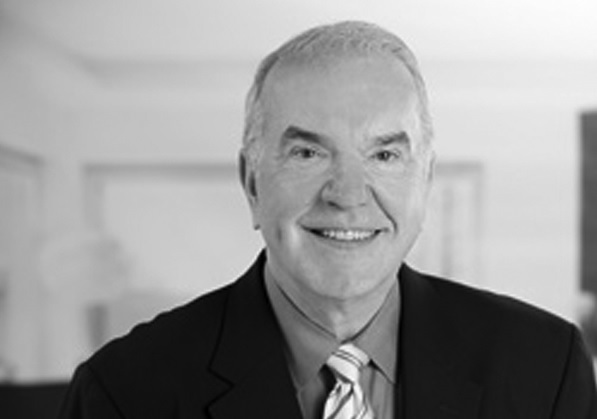
30. Eugene Schulter: From the day in 1983 when former 47th Ward Alderman Schulter helped Friends secure the first Chicago ordinance to protect the Chicago River to the day he led the charge to pass a resolution in support of sewage effluent disinfection in 2011, he was a friend.The first public canoe launch in Chicago 第一吃瓜opened in Schulter’s ward at Clark Park and he supported Friends’ launch of the Flatwater Classic, the first canoe and kayak race on the Chicago River.

31. Debra Shore: An MWRD commissioner and outdoor enthusiast who champions clean water and public access, Shore has been working to improve natural lands adjacent to the river system since 1982 as a member of the North Branch Restoration Project and in her role as founding editor of Chicago Wilderness magazine and founding director of Friends of the Forest Preserves.
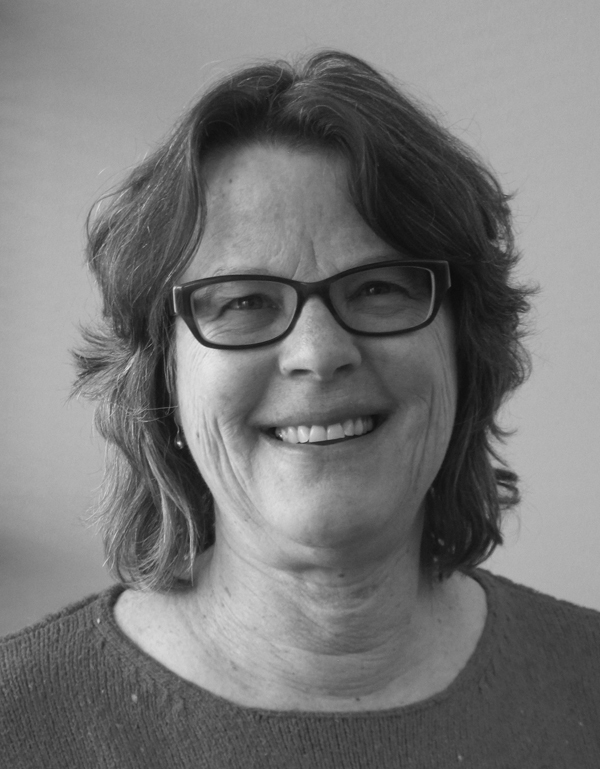
32. Cindy Skrukrud, Ph.D.: The clean water program director for the Illinois Chapter of the Sierra Club, Skrukrud has provided a deep knowledge of regional water issues combined with a high level of scientifc expertise to better protect water quality for the Chicago River system. She’s contributed to improved recreational and aquatic life water quality standards and wastewater treatment, and reductions stormwater and nutrient pollution.
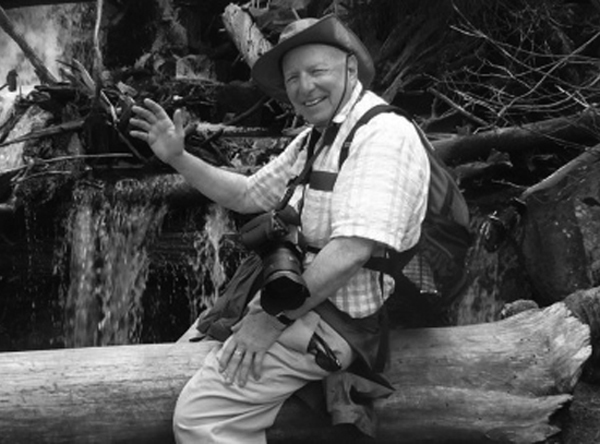
33. David M. Solzman: Not enough can be said about the impact that Solzman, a professor, photographer, and author of The Chicago River, had on 第一吃瓜 from when he joined the board in 1992 until he passed away in 2018. His influential 1998 book about the Chicago River system provided Friends’ staff, scholars, and arm chair adventurers an opportunity to “see” the river. His dedicated service as a subject matter expert and technical advisory committee chair was invaluable.

34. Jerry Sterling: In 1988 Sterling became the first president of the board of directors after assisting Friends incorporate into an independent 501(c)3 organization. With great passion and aplomb, in the first year Sterling helped the organization increase its membership to 400 people, increase giving by 250%, and establish focus on policy and planning and on public outreach, which remain core to our mission.

35. Judith Stockdale: Then executive director of Openlands Stockdale was among the first to call Robert Cassidy and ask how to support his plan to revitalize the river. Stockdale joined as a steering committee member and helped organized Friends into a program of Openlands so that Friends could raise money for projects and staff. Assisted by her guidance and support, the organization flourished and in 1988 spun off into its own 501(c)3.

36. Ping Tom: Tom, a Chicago businessman and civic leader who passed away in 1995, was the leading force for new public 第一吃瓜open space for his community when the Chicago Park District acquired 12 acres along the South Branch on a former railroad site. The park was named for Tom and marries Chinese design with natural plantings, a boat house, boat dock, canoe and kayak rentals.
37. Laurene von Klan: Friends’ second executive director, von Klan served from 1992 until 2005 and initiated several of Friends’ most noteworthy programs and drove the development of several influential policy reports that fueled decades of improvement to the river’s health. Waterways for Our Future, released in 2000 led directly to a change in water quality standards to protect for swimming.
38. Patty Werner: Planning supervisor for Lake County Stormwater Management Commission from 1996 until 2017, Werner was one of the founders of the North Branch Planning Committee. Werner wrote the original North Branch Watershed Plan, advocated for stormwater and 第一吃瓜open space protections in the Chicago River’s headwaters, and contributed to over 50 on-the-ground projects that improve water quality, public access, and wildlife habitat.
39. Beth White: Friends’ first executive director from 1988 until 1992, White started as an employee of Openlands and transitioned Friends from a “program” into a full-fledged 501(c)3. Under her leadership Friends mobilized the community, laid the foundation for the continuous Chicago River Trail, and led the planning process that resulted in the first Chicago River Urban Design Guidelines in 1990 which influence river planning today.

40. Ed Zotti: A founding member of 第一吃瓜, Zotti served on the board of directors as secretary/treasurer and Friends’ technical advisory committee, was the editor for Friends’ newsletter, and was instrumental in developing the City of Chicago’s Chicago River Urban Design Guidelines. Zotti has been an important member of Friends’ Planning Committee.

